A Customer Success Manager (CSM) plays a key role in ensuring that customers achieve their desired outcomes while using a company's product or service. They act as the main point of contact for customers, guiding them through onboarding, adoption, and ongoing support to ensure a positive and productive customer experience.
Skills required for a Customer Success Manager include strong communication and relationship-building abilities, a deep understanding of the product or service, and the capability to analyze customer data to identify trends and opportunities. Additionally, they must be adept at problem-solving and have a proactive approach to addressing customer needs.
Candidates can write these abilities in their resumes, but you can’t verify them without on-the-job Customer Success Manager skill tests.
In this post, we will explore 9 essential Customer Success Manager skills, 11 secondary skills and how to assess them so you can make informed hiring decisions.
Table of contents
9 fundamental Customer Success Manager skills and traits
The best skills for Customer Success Managers include Product Knowledge, Customer Onboarding, Data Analysis, Communication Skills, Problem Solving, Relationship Building, Technical Proficiency, Time Management and Customer Advocacy.
Let’s dive into the details by examining the 9 essential skills of a Customer Success Manager.
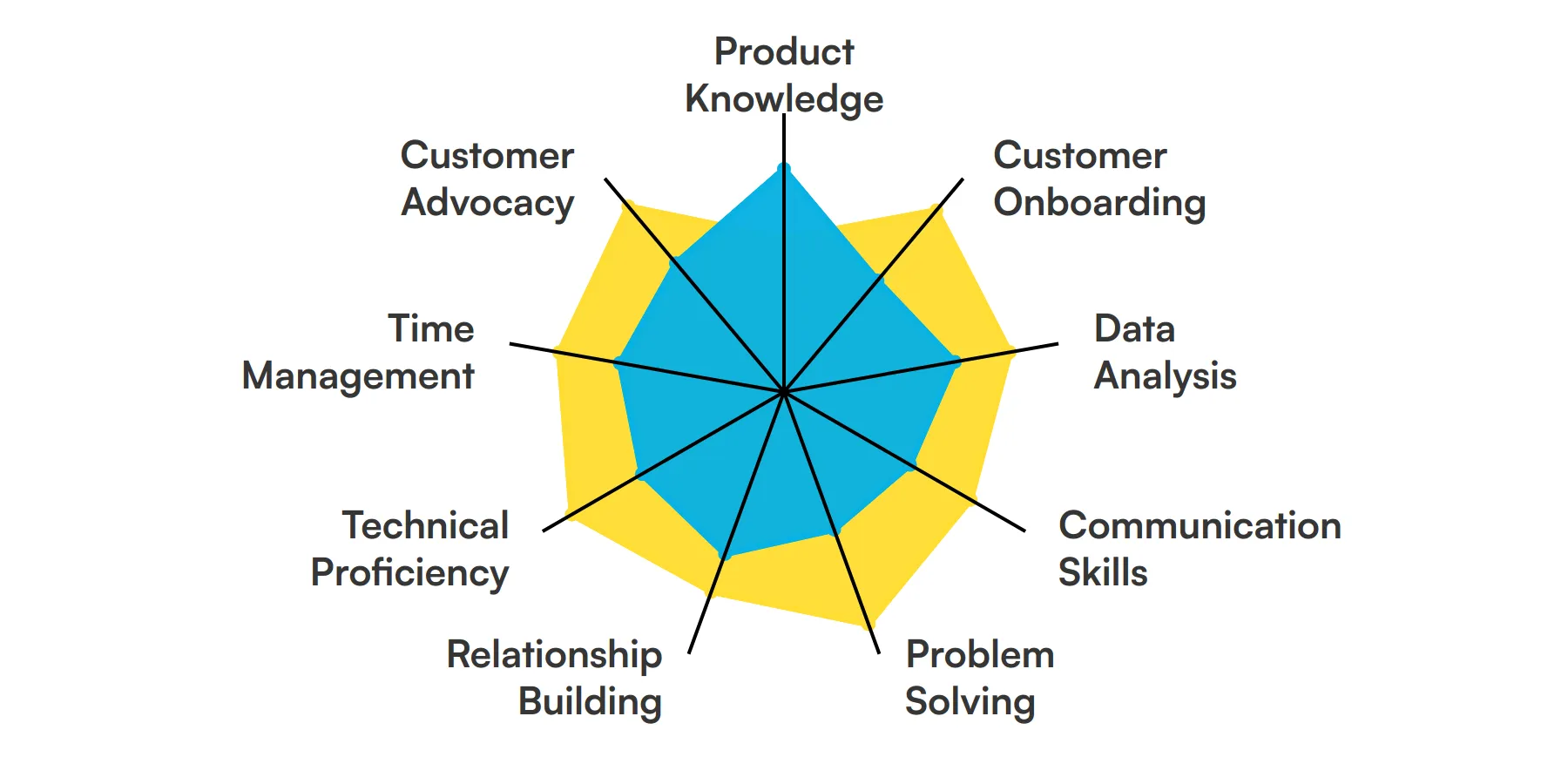
Product Knowledge
A Customer Success Manager must have a deep understanding of the product they are supporting. This knowledge allows them to provide accurate information, troubleshoot issues, and offer valuable insights to customers, ensuring they get the most out of the product.
For more insights, check out our guide to writing a Product Manager Job Description.
Customer Onboarding
Effective onboarding is crucial for customer retention. A Customer Success Manager guides new customers through the initial setup and training, ensuring they understand how to use the product and can start seeing value quickly.
Data Analysis
Analyzing customer data helps in understanding usage patterns, identifying potential issues, and recognizing opportunities for upselling or cross-selling. A Customer Success Manager uses data to make informed decisions and tailor their approach to each customer.
Check out our guide for a comprehensive list of interview questions.
Communication Skills
Clear and concise communication is key in this role. Whether it's through emails, phone calls, or meetings, a Customer Success Manager must convey information effectively to ensure customers understand and feel supported.
Problem Solving
Customers will inevitably face challenges, and a Customer Success Manager needs to be adept at identifying issues and finding solutions quickly. This skill helps in maintaining customer satisfaction and trust.
Relationship Building
Building strong relationships with customers is at the heart of customer success. A Customer Success Manager fosters trust and loyalty by regularly engaging with customers and understanding their needs and goals.
For more insights, check out our guide to writing a Customer Success Manager Job Description.
Technical Proficiency
A good grasp of the technical aspects of the product is necessary. This allows the Customer Success Manager to assist with more complex issues and provide a higher level of support.
Time Management
Managing multiple accounts and tasks efficiently is crucial. A Customer Success Manager must prioritize their workload to ensure timely responses and proactive engagement with customers.
Customer Advocacy
Acting as the voice of the customer within the company, a Customer Success Manager ensures that customer feedback is heard and considered in product development and company strategies.
11 secondary Customer Success Manager skills and traits
The best skills for Customer Success Managers include Project Management, Negotiation Skills, Training and Education, Conflict Resolution, Marketing Insight, Sales Acumen, Product Feedback, Empathy, Adaptability, Documentation Skills and Networking.
Let’s dive into the details by examining the 11 secondary skills of a Customer Success Manager.
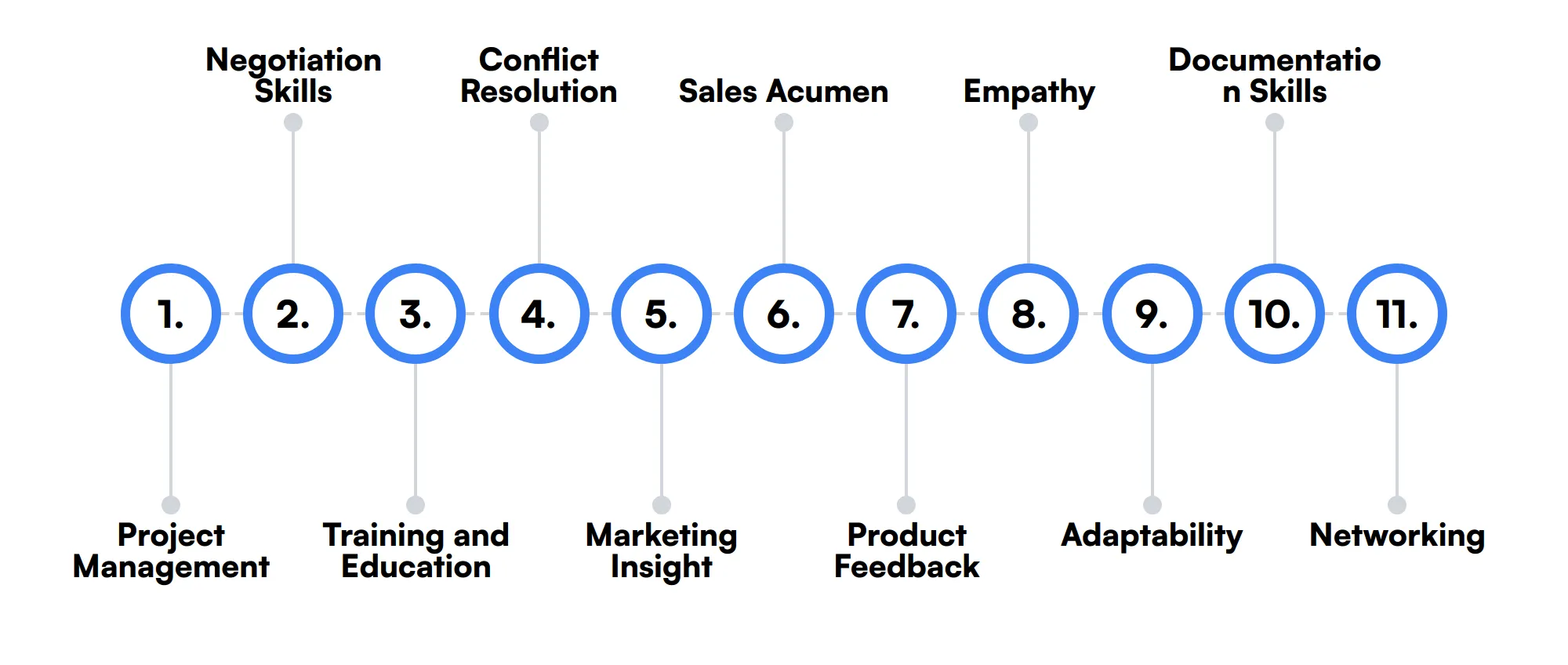
Project Management
Managing customer projects, such as implementations or upgrades, requires strong project management skills to ensure everything runs smoothly and on schedule.
Negotiation Skills
Occasionally, a Customer Success Manager may need to negotiate contract renewals or upsell opportunities. Strong negotiation skills can help in achieving favorable outcomes for both the customer and the company.
Training and Education
Providing training sessions and educational resources helps customers maximize their use of the product. This can include webinars, tutorials, and one-on-one training sessions.
Conflict Resolution
Handling dissatisfied customers and resolving conflicts is part of the job. A Customer Success Manager must be able to de-escalate situations and find amicable solutions.
Marketing Insight
Understanding marketing strategies can help a Customer Success Manager align their efforts with the company's broader goals and identify opportunities for customer engagement.
Sales Acumen
While not a primary focus, having a basic understanding of sales principles can help in identifying upsell and cross-sell opportunities and collaborating with the sales team.
Product Feedback
Collecting and relaying customer feedback to the product team helps in improving the product. A Customer Success Manager plays a key role in this feedback loop.
Empathy
Understanding and empathizing with customer concerns helps in building stronger relationships and providing better support.
Adaptability
The ability to adapt to changing customer needs and company policies is important. A Customer Success Manager must be flexible and open to change.
Documentation Skills
Creating and maintaining accurate records of customer interactions and issues is essential for continuity and future reference.
Networking
Building a network within the industry can provide valuable insights and opportunities for collaboration. A Customer Success Manager benefits from having a strong professional network.
How to assess Customer Success Manager skills and traits
Assessing the skills and traits of a Customer Success Manager (CSM) involves more than just glancing at a resume. It requires a deep dive into their capabilities and how they handle real-world scenarios. A CSM must not only be adept at managing relationships but also excel in areas like data analysis and technical proficiency.
To effectively evaluate these skills, companies are increasingly turning to specialized assessments that simulate actual customer interactions and challenges. For instance, Adaface offers tailored assessments that can help you measure a candidate's proficiency across key areas such as product knowledge, customer onboarding, and problem-solving. By using these tests, companies have reported an 85% reduction in screening time.
Moreover, these assessments are designed to highlight a candidate's ability in critical areas like communication skills, time management, and customer advocacy, ensuring that you find a CSM who not only knows your product inside and out but can also champion your customers' needs effectively.
Let’s look at how to assess Customer Success Manager skills with these 6 talent assessments.
AI Product Manager Test
AI Product Manager Test assesses a candidate's knowledge and skills in managing AI-driven products. It evaluates understanding of AI concepts, product strategy, customer insights, project management, and data analysis.
The test covers storytelling, AI fundamentals, generative AI applications, data modeling, project management, data analysis, communication skills, and business analysis. Candidates answer questions on product management, business analysis, artificial intelligence, and data modeling.
Successful candidates demonstrate a strong grasp of AI concepts, effective communication, and the ability to manage AI projects. They also show proficiency in data analysis and business strategy.
Customer Success Test
Customer Success Test assesses a candidate's knowledge and skills in the field of customer success. The test evaluates understanding of customer behavior, effective communication, problem-solving abilities, and the ability to develop and maintain strong customer relationships.
The test covers customer success, business analysis, communication skills, situational judgement, critical thinking, and verbal reasoning. Candidates answer questions on customer success, situational judgement, critical thinking, verbal reasoning, and business analysis.
High-scoring candidates show strong problem-solving skills, effective communication, and the ability to understand and manage customer relationships.
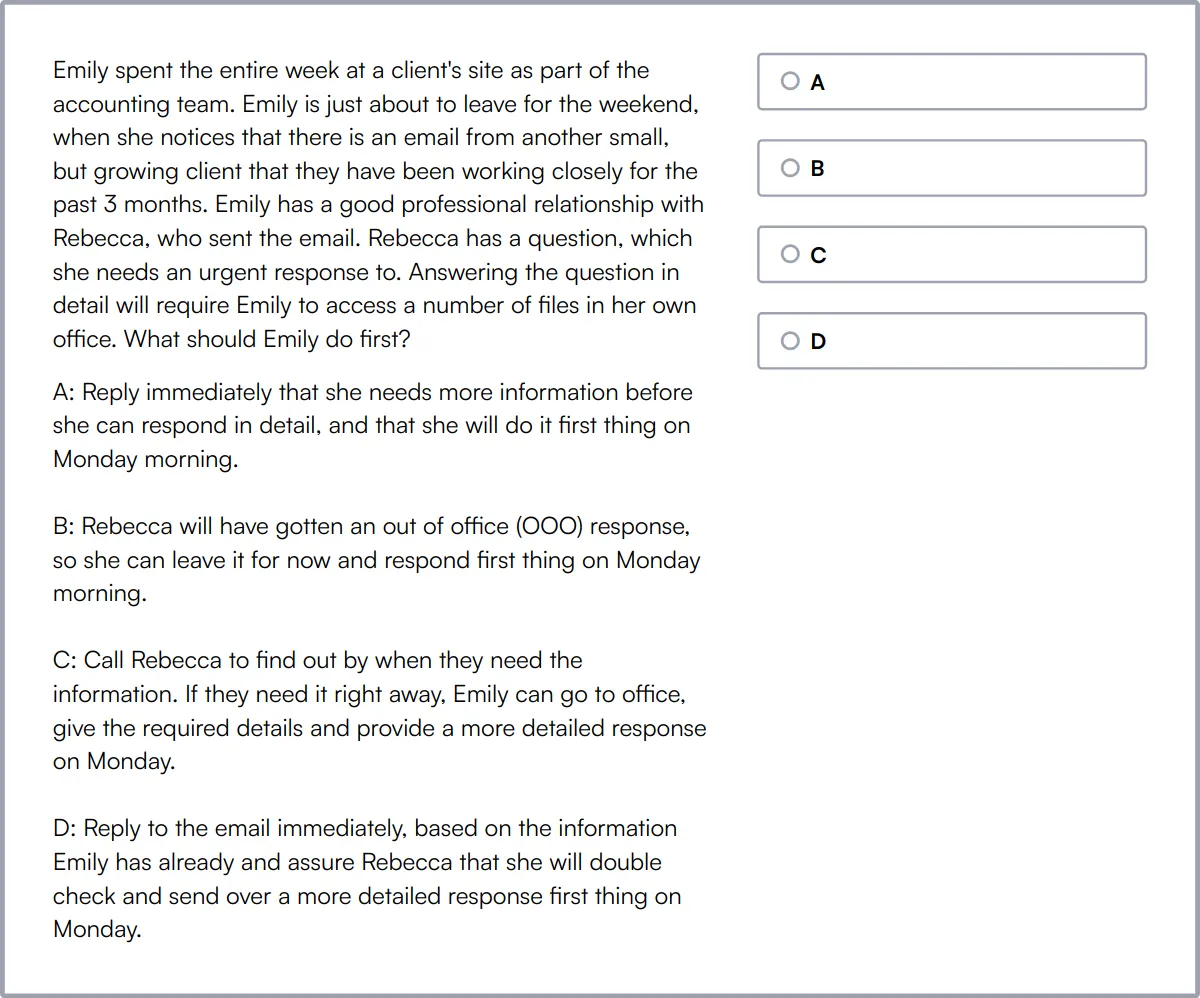
Data Analysis Test
Data Analysis Test assesses a candidate's ability to handle, modify, analyze, and interpret data. The test uses scenario-based MCQ questions to screen for experience with analyzing data to find possible outcomes, detect anomalies, extract meaningful insights, project estimates, and visualize data using charts and graphs.
The test covers basics of data modeling, data analysis, business analysis fundamentals, data interpretation, data queries and databases, data operations, data investigations, and popular data tools. Candidates answer questions on data analysis, SQL, and data interpretation.
Successful candidates demonstrate proficiency in data analysis, SQL, and data interpretation, showing their ability to extract insights and visualize data effectively.

Communication Skills Test
Communication Skills Test evaluates candidates' communication skills, including verbal and written communication, active listening, and interpersonal skills. It assesses their ability to effectively communicate with customers, colleagues, and stakeholders in various professional scenarios.
The test covers communication skills, situational judgement, attention to detail, critical thinking, and verbal reasoning. Candidates answer questions on situational judgement, communication skills, critical thinking, and verbal reasoning.
High-scoring candidates show strong verbal and written communication skills, active listening, and the ability to navigate professional scenarios effectively.
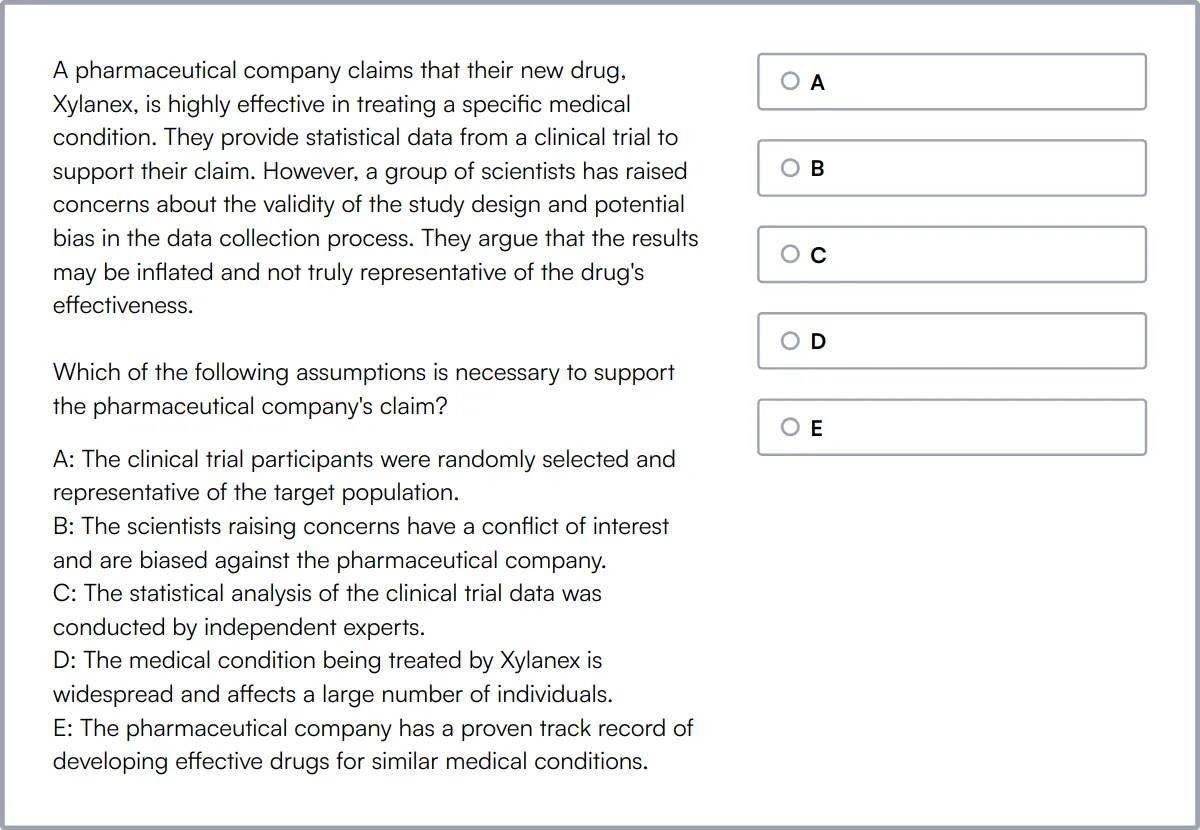
Problem Solving Test
Problem Solving Test evaluates a candidate's ability to understand instructions, analyze data, and respond to complex problems or situations. The questions provide insights into their problem-solving, learning agility, and coachability.
The test covers abstract reasoning, critical thinking, deductive reasoning, inductive reasoning, pattern matching, and spatial reasoning. Candidates answer questions on logical reasoning, data interpretation, spatial reasoning, abstract reasoning, and critical thinking.
Successful candidates demonstrate strong problem-solving skills, logical reasoning, and the ability to analyze and respond to complex situations.
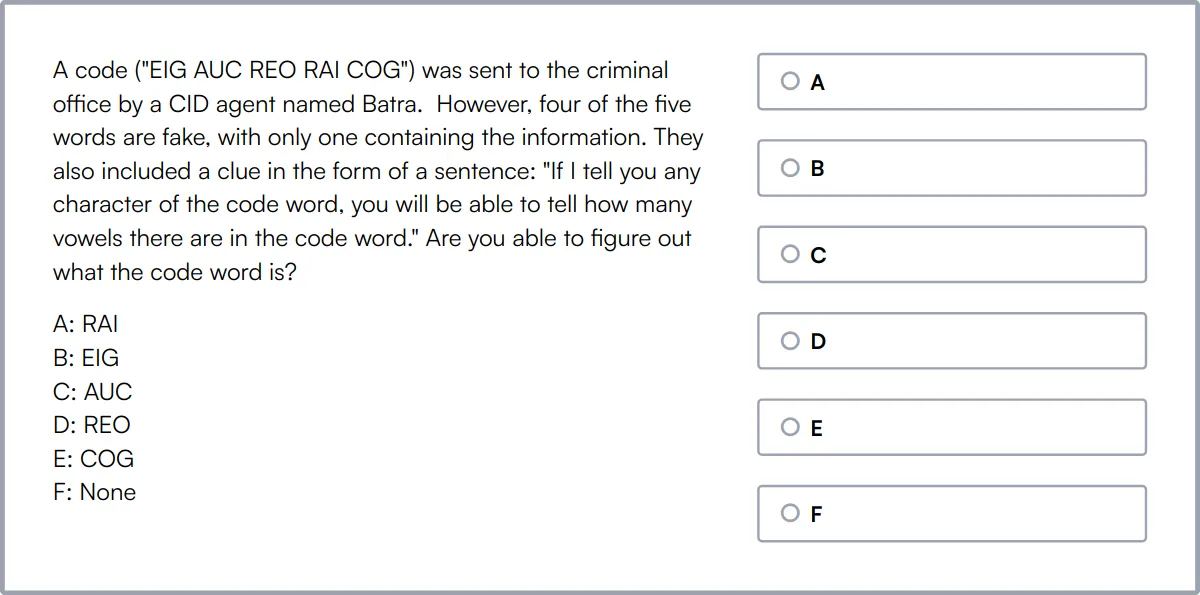
Customer Service Aptitude Test
Customer Service Aptitude Test evaluates a candidate's skills in customer service, attention to detail, problem-solving, verbal reasoning, numerical reasoning, and logical reasoning.
The test covers customer service, attention to detail, verbal reasoning, numerical reasoning, logical reasoning, and communication skills. Candidates answer questions on customer service, situational judgement, abstract reasoning, verbal reasoning, and English.
High-scoring candidates show strong customer service skills, attention to detail, and the ability to solve problems and reason logically.
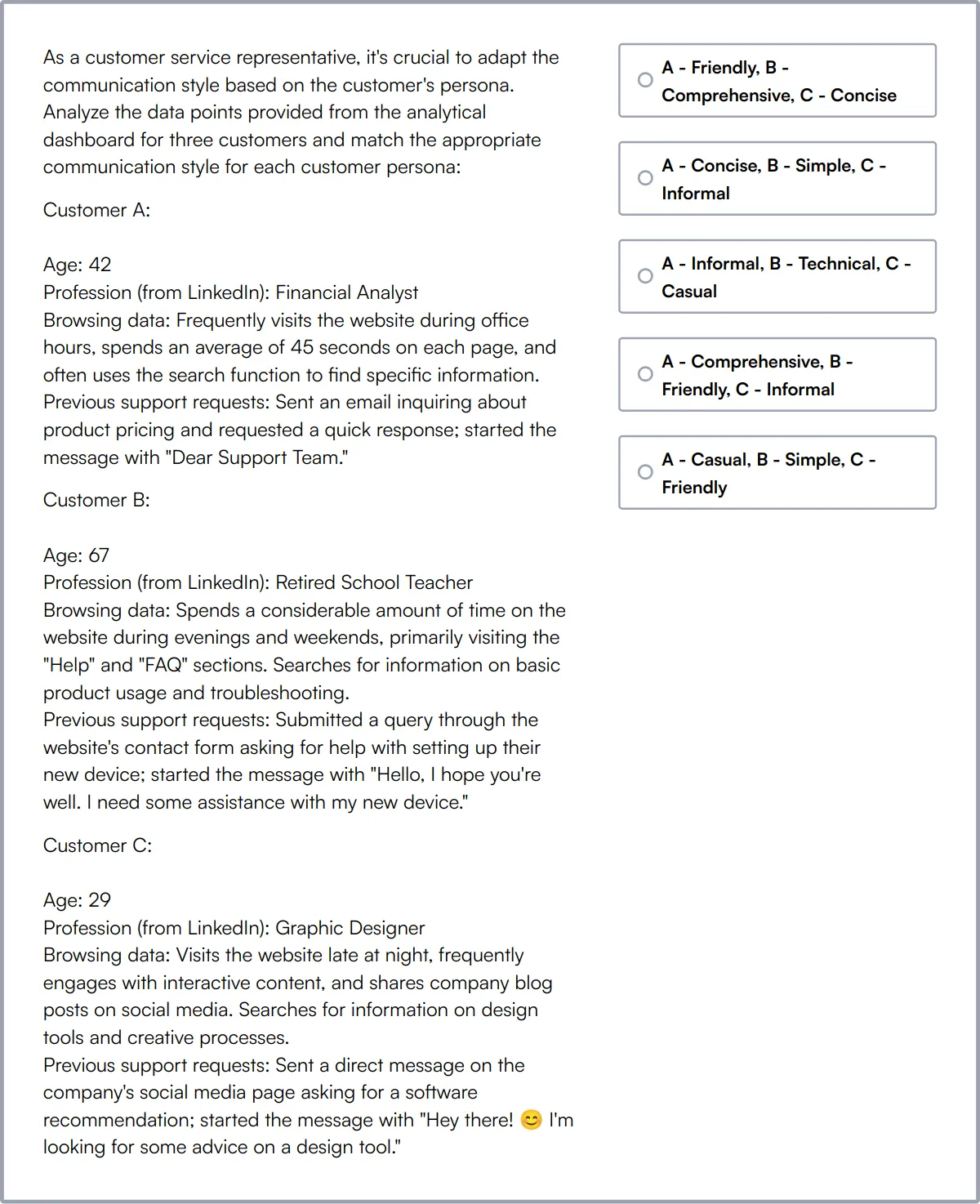
Summary: The 9 key Customer Success Manager skills and how to test for them
| Customer Success Manager skill | How to assess them |
|---|---|
| 1. Product Knowledge | Evaluate understanding of product features and benefits. |
| 2. Customer Onboarding | Assess ability to guide new customers through initial setup. |
| 3. Data Analysis | Measure proficiency in interpreting and utilizing customer data. |
| 4. Communication Skills | Check clarity and effectiveness in conveying information. |
| 5. Problem Solving | Determine capability to identify and resolve customer issues. |
| 6. Relationship Building | Gauge ability to foster long-term customer relationships. |
| 7. Technical Proficiency | Assess familiarity with relevant software and tools. |
| 8. Time Management | Evaluate skill in prioritizing tasks and meeting deadlines. |
| 9. Customer Advocacy | Measure commitment to representing customer interests. |
Customer Service Aptitude Test
Customer Success Manager skills FAQs
What are the key skills a Customer Success Manager should possess?
A Customer Success Manager should have a diverse skill set including product knowledge, communication skills, problem-solving, relationship building, and data analysis. Additionally, skills like project management, negotiation, and technical proficiency are important.
How can recruiters assess communication skills in Customer Success Manager candidates?
Recruiters can assess communication skills by evaluating a candidate's performance in structured interviews, reviewing written communication samples, and observing interaction skills in group assessment activities.
What role does data analysis play in a Customer Success Manager's daily activities?
Data analysis is crucial for understanding customer usage patterns, identifying areas for improvement, and measuring the impact of customer success initiatives. It helps in making informed decisions to enhance customer satisfaction and retention.
Why is empathy important for a Customer Success Manager?
Empathy allows Customer Success Managers to understand and relate to the challenges and needs of their customers, fostering stronger relationships and enabling more effective problem resolution.
How can project management skills benefit a Customer Success Manager?
Project management skills help Customer Success Managers to efficiently organize and manage customer onboarding, implementation projects, and ongoing customer engagements, ensuring timely and successful delivery of services.
What techniques can be used to evaluate a candidate's problem-solving abilities?
To evaluate problem-solving abilities, recruiters can use case studies, role-playing scenarios, and situational judgment tests that simulate real-life challenges faced by Customer Success Managers.
How important is technical proficiency for a Customer Success Manager?
Technical proficiency is important as it enables Customer Success Managers to understand the product deeply, troubleshoot issues, and provide accurate solutions and advice to customers, enhancing user experience and satisfaction.
What is the significance of training and education in the role of a Customer Success Manager?
Training and education are key for Customer Success Managers to stay updated on product features, industry trends, and best practices. This knowledge is essential to effectively support and advise customers, and drive product adoption.

40 min skill tests.
No trick questions.
Accurate shortlisting.
We make it easy for you to find the best candidates in your pipeline with a 40 min skills test.
Try for freeRelated posts
Free resources



